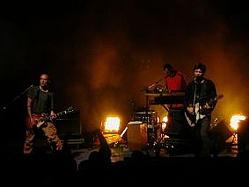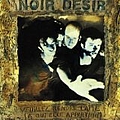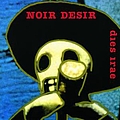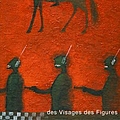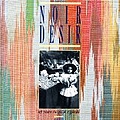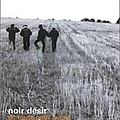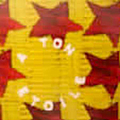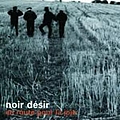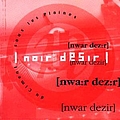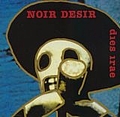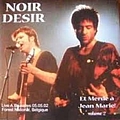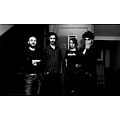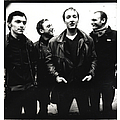Noir Desir Biography
Noir Désir is a French rock band from Bordeaux. They were the most successful French rock band of the 1990s and early 2000s, having two albums certified double platinum and three certified gold in France. They have been an influence on numerous French musicians including Cali, Louise Attaque and Miossec.[2] The band currently consists of Bertrand Cantat(vocals, guitar), Serge Teyssot-Gay(guitar), Jean-Paul Roy(bass guitar) and Denis Barthe(drums). History Formation: 1980-1985 Bertrand Cantat and Serge Teyssot-Gay met in 1980 at secondary school after Cantat moved to Bordeaux from his hometown in Normandy; Teyssot-Gay was 17 and Cantat was 16 at the time. The two teenagers shared a love of music, particularly Led Zeppelin, The Who, and AC/DC and so they decided to form a band. Teyssot-Gay had a strong musical background, with a decade of classical guitar training under his belt, however Cantat could not play any instrument at the time, and so became the singer for their band. They met Denis Barthe, during the the the summer vacation who shared a similar passion for music and he agreed to play drums for the band, although he had never played them before. They went through a series of temporary bassists, eventually settling on Vincent Leriche. The band originally called themselves "Psychoz", then "6.35", "Station Désir" and finally "Noirs Désirs". In 1982 Teyssot-Gay and Leriche left the group to form BAM (Boîte A Musique). The remaining band members, Barthe and Cantat, went in search for a replacement guitarist and bassist. For the bass they found Frèdèric Vidalenc, who had played in the well reputed local group Dernier Métro, and eventualy they settled on Luc Robène for guitar.[3] However the next year Cantat would also leave the band temporarally, being replaced by Emmanuel Ory-Weil, who would later become the band's manager. When Robène quit in 1985 Cantat was eager to get their original guitarist, Teyssot-Gay, back into the band and succeded. The new lineup of Cantat on vocals, Teyssot-Gay on guitar, Vidalenc on bass and Barthe on drums continued for 11 more years. Early albums: 1985-1991 Now with a new and finally steady lineup the band decided to make an attempt at getting a recording contract. They created a demo which was heard by Théo Hakola of the American band Passion Fodder. Hakola urged the french label Barclay records to sign the band up, and the artistic director agreed to see the band in concert first. At first the label wished the band to produce a single, however after two months of negatiations it was agreed that a mini-album would be made instead. The label did not expect much success from the groupt though, with the director of the label commenting "If we sell 1500 copies of your disk, that will already be be a success" (Si on vend 1 500 exemplaires de votre disque, ce sera déjà très bien.) The label disliked the name Noirs Désirs, feeling it to be old fasioned, the band agreed to change only two letters, unpluralising the name to Noir Désir. In 1987 they released the mini-album, Où veux tu qu'je r'garde?. After two months it had sold 5,000 copies, exceding the expectations of Barclay, who signed the band for another three albums. Their first critical and popular success came two years later, in 1989, with their next album, Veuillez rendre l'âme (à qui elle appartient). It became recognised as one of the best French rock albums ever made, and produced a very popular hit single: "Aux sombres héros de l'amer", a sea-shanty-like harmonica-driven ballad that uses the metaphor of sailors "lost in the sea" to speak of the 19th century "poètes maudits" and other fellow navigators of existential emptiness. However the group were dismayed that many people had missed this double meaning of the song, and interpreted it as merely a meaningless sea shanty. They were also worried that people would judge them based on this one song, without listening to the rest of the album, which had a much harder, punk rock oriented sound. In their next two albums the band would return to the harder sound of Où veux-tu qu'je r'garde ? and develop it even further. This development was largely a reaction to their worries about the success of the single Aux sombres héros de l'amer. Post Success: 1991-2003 Their third album Du ciment sous les plaines (1991) received lack luster success in comparison to their previous album, but still spawned the popular song En route pour la joie. In May 1991 a concert in Besançon was cut short after four songs when Bertrand Cantat collapsed on stage, resulting in the band taking a break from touring until the release of their next album, Tostaky.Unlike Du ciment sous les plaines, Tostaky was released to much acclaim and popular success. In January 1994 the live album Dies Irae was released, showcasing the frenzy of the band's performances. However the touring took its toll on Cantat, who eventually ended up in hospital for an operation on his vocal cords.After this gruelling tour the band decided to take a year's break, both from playing and from each other.During their break Bertrand Cantat received professional singing training and bass-player Frédéric Vidalenc quit the group to pursue his own projects; he was replaced by longtime friend of the band, Jean-Paul Roy. Serge Teyssot-Gay used his spare time during the break to record a solo album, Silence Radio, which would be finished and released in 1996. In December, 1996 the success of Tostaky was continued with the release of 666.667 Club, which would be certified double platinum a year after its release. In 1998, after hearing a remix of their song "Septembre, en attendant", they released the album One Trip, One Noise which comprised a collection of their songs remixed by young musicians. Their most recent album, 2001's Des visages des figures was much quieter than any of their previous albums, but was very well received, selling over 1 million copies. The group received five Victoires de la Musique award nominations, winning Best Rock Album of the Year and Music Video of the Year for "Le Vent nous portera", in collaboration with the French/Spanish artist Manu Chao. During the awards ceremony Cantat read out a speech on behalf of the band, addressed to Jean-Marie Messier, the CEO of Vivendi, the group which owns Noir Désir's record company, Universal. Messier was a controversial figure in France at the time, due to the perception that he was abandonning his French routes in favor of Americanization. In their speech, Noir Désir accused Vivendi of exploiting their band’s name in order to rebut criticism of Messier's treatment of French culture. The band played few concerts for their Des visages des figures tour, however all were held in very large venues, except those in the Middle East tour, which allowed the band to go back to their routes playing in small clubs.[6] Most of the concerts were held outside of France. They were invited to perform a one off concert at the “Montpellier Radio-France” festival in 2002. The 55 minute performance comprised Cantat reciting a long-form poem of his entitled "Nous n'avons fait que fuir", over musical improvisations played by the rest of the band. Incarceration of Bertrand Cantat: 2003-2007 In 2003, following an argument about infidelity, Bertrand Cantat, drunk at the time, hit his girlfriend Marie Trintignant, also drunk, multiple times in a hotel room in Vilnius, Lithuania. After this incident Bertrand Cantat put her to bed and called her brother who was in the area. Seeing his sister in bed, he thought she was asleep and advised Cantat to wait until the morning. The following morning, Marie Trintignant was found in a coma in her bed and died a few days later. A post mortem examination showed that she had suffered multiple head injuries. Cantat admitted to hitting her 4 times, however prosecutors argued that it was in fact 19 times in all. He later alleged she had fallen and hit her head on a radiator[15], becoming unconscious from this impact, not his blows directly. On 29 March 2004, a Lithuanian court sentenced Cantat to eight years in prison after he was found guilty of causing the death of Marie Trintignant, but without intending to do so. After a year spent in Lukiškės prison of Vilnius, he was moved to a prison near Toulouse, France. September 2005 brought two new releases of Noir Désir's work. The album, Noir Désir en public, which had been started before the incident in Vilnius, contained highlights of their last tour, in which they had recorded every concert performed. The DVD set, Noir Désir en images, contained various live performances footage and videos. Special permission was obtained for the imprisoned Cantat to participate in the development of both the CD and the DVD. A Discrete Return: 2007-present Cantat was freed on parole on October 16, 2007. A condition of his release was that he must receive regular psychological counseling and refrain from public reference to the murder in interviews or in music. In November 2008 the band released two free tracks on their website, performed by the whole band (including Bertrand Cantat). The songs are "Gagnants/Perdants" and a cover of "Le temps des cerises". Serge Teyssot-Gay, the guitarist of the band, has stated that the group is currently in the process of composing and recording a new album which he feels should be finished in 2009. However according to a May 14, 2009 article in Le Parisien the album will not be ready until January 2010.
Top Noir Desir Lyrics
Write a comment
What do you think about Noir Desir? Let us know in the comments below!
Noir Desir Albums
Similar artists
- EiffelRock
- Louise AttaqueRock
- No One Is InnocentMetal/Rock
- MatmatahRock
- DionysosIndie/Rock
- LukeRock
- SaezRock
- Alain BashungRock
